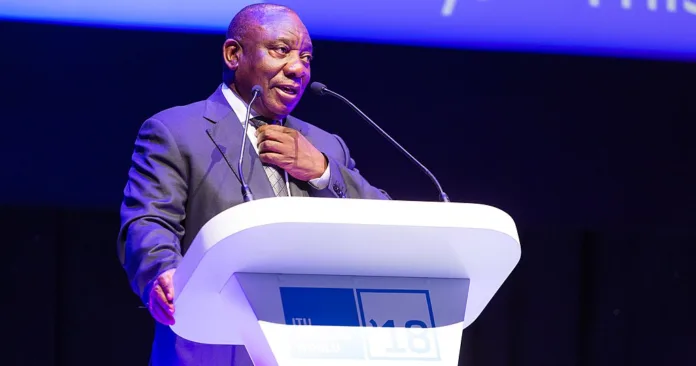President Cyril Ramaphosa pushes back against the da’s demands for ministerial positions, citing offensive negotiation tactics and shifting goals
President Cyril Ramaphosa of South Africa has intensified negotiations this week aimed at forming a Government of National Unity (GNU) following inconclusive 2024 elections. In a firm stance, Ramaphosa addressed DA leader John Steenhuisen, urging prompt decision-making to conclude negotiations by week’s end.
The ANC, having failed to secure a clear majority in the recent national and provincial elections, has engaged in talks with various parties, including the DA, to establish a coalition government. The GNU framework would involve appointing members from multiple parties to Ramaphosa’s cabinet, aiming to foster unity amidst political fragmentation.
Embed from Getty ImagesIn a letter dated June 25, Ramaphosa expressed concerns over the DA’s negotiation approach, primarily communicating through written correspondence. He criticized this method for potentially sensationalizing discussions through media leaks, emphasizing the necessity of face-to-face dialogues for substantive negotiations.
Key to the deadlock is a letter penned by Helen Zille, DA’s federal council chair, outlining ambitious demands. These included securing at least 12 ministerial positions with their deputies, and a preference for the deputy presidency or the minister in the Presidency role. Zille also proposed stringent oversight mechanisms over ministerial appointments and policy decisions, which Ramaphosa deemed legally problematic and constitutionally inconsistent.
Ramaphosa labelled Zille’s letter as offensive and condescending, stressing that such tactics undermine the negotiation process’s integrity. He expressed disappointment in what he perceived as the DA’s deliberate shifting of negotiation terms, citing recent demands for additional ministerial portfolios beyond initial proposals.
Specifically, the DA requested the inclusion of two new portfolios, potentially expanding their representation to eight ministries. This move, according to Ramaphosa, deviates from earlier agreements and complicates efforts to finalize the GNU, reflecting broader disagreements on the structure and authority within the coalition government.
The ANC leader emphasized that the DA’s evolving demands, coupled with their interpretation of negotiation frameworks, threaten the foundational principles of a Government of National Unity. He reiterated his reluctance to entertain proposals that could circumvent constitutional norms or disrupt governmental protocols.
Despite these setbacks, Ramaphosa signalled openness to further discussions with the DA and other negotiating parties. He underscored the urgency of resolving governmental paralysis and reiterated his commitment to concluding negotiations promptly, seeking consensus among all involved parties.
Analysis:
Political: The standoff between Ramaphosa’s ANC and Steenhuisen’s DA underscores the complexities of coalition politics in South Africa. It highlights challenges in forming a stable government post-election, with both parties vying for influential ministerial positions to influence policy and governance.
Social: The negotiations reflect broader societal expectations for effective governance and unity amid political fragmentation. Public sentiment may sway based on perceived fairness in ministerial allocations and the coalition’s ability to address pressing social issues.
Racial: While not explicitly racial, the negotiations indirectly reflect historical racial tensions in South African politics, where party alliances often correlate with demographic and regional divisions. The composition of the GNU could influence perceptions of racial representation and equality in governance.
Gender: Gender dynamics may play a role in ministerial appointments and leadership roles within the GNU. Parties’ stances on gender equity in decision-making could influence public perception and support, especially in a country striving for inclusive governance.
Economic: The formation of a GNU impacts economic policies and stability. Uncertainty stemming from prolonged negotiations could affect investor confidence and economic planning, highlighting the need for swift resolution to mitigate financial risks.
